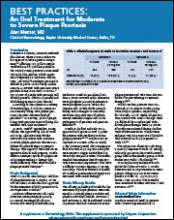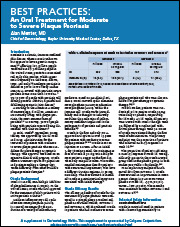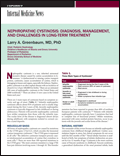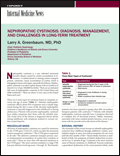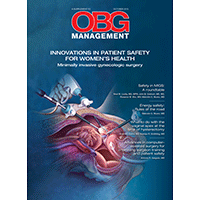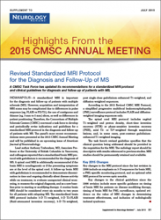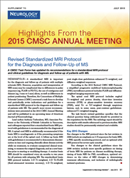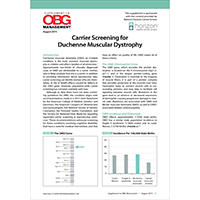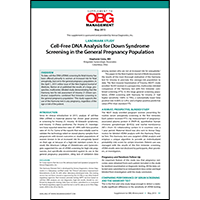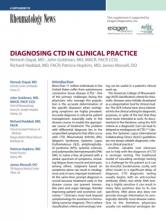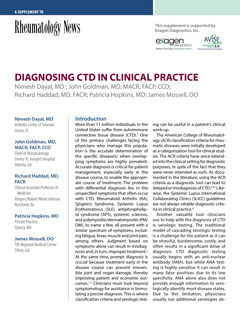User login
BEST PRACTICES: An Oral Treatment for Moderate to Severe Plaque Psoriasis
A Best Practices Supplement to Dermatology News. This supplement was sponsored by Celgene Corporation.
Faculty/Faculty Disclosures
Alan Menter, MD
Baylor University Medical Center
Dallas, TX
Dr Menter is on the advisory board for AbbVie, Allergan, Amgen, Boehringer Ingelheim, Eli Lilly, Genentech Inc., Janssen Biotech, Inc., LEO Pharma and Pfizer; is a consultant for AbbVie, Allergan, Amgen, Convoy Therapeutics, Inc., Eli Lilly, Janssen Biotech, Inc., LEO Pharma, Novartis, Pfizer, Syntrix, Vitae, Wyeth and XenoPort; is an investigator for AbbVie, Allergan, Amgen, Boehringer Ingelheim, Celgene, Eli Lilly, Genentech, Janssen Biotech, Inc., LEO Pharma, Merck, Novartis, Pfizer, Symbio/Maruho, Syntrix and Wyeth; is a speaker for AbbVie, Amgen, Janssen Biotech, Inc., LEO Pharma and Wyeth; has received grant funds from AbbVie, Allergan, Amgen, Boehringer Ingelheim, Celgene, Genentech, Janssen Biotech, Inc., LEO Pharma, Merck, Novartis, Pfizer, Symbio/Maruho and Syntrix; and has received honoraria from AbbVie, Allergan, Amgen, Boehringer Ingelheim, Convoy Therapeutics, Inc., Eli Lilly, Genentech, Janssen Biotech, Inc., LEO Pharma, Novartis, Pfizer, Syntrix, Vitae, Wyeth and XenoPort.
Copyright © by Frontline Medical Communications Inc.
A Best Practices Supplement to Dermatology News. This supplement was sponsored by Celgene Corporation.
Faculty/Faculty Disclosures
Alan Menter, MD
Baylor University Medical Center
Dallas, TX
Dr Menter is on the advisory board for AbbVie, Allergan, Amgen, Boehringer Ingelheim, Eli Lilly, Genentech Inc., Janssen Biotech, Inc., LEO Pharma and Pfizer; is a consultant for AbbVie, Allergan, Amgen, Convoy Therapeutics, Inc., Eli Lilly, Janssen Biotech, Inc., LEO Pharma, Novartis, Pfizer, Syntrix, Vitae, Wyeth and XenoPort; is an investigator for AbbVie, Allergan, Amgen, Boehringer Ingelheim, Celgene, Eli Lilly, Genentech, Janssen Biotech, Inc., LEO Pharma, Merck, Novartis, Pfizer, Symbio/Maruho, Syntrix and Wyeth; is a speaker for AbbVie, Amgen, Janssen Biotech, Inc., LEO Pharma and Wyeth; has received grant funds from AbbVie, Allergan, Amgen, Boehringer Ingelheim, Celgene, Genentech, Janssen Biotech, Inc., LEO Pharma, Merck, Novartis, Pfizer, Symbio/Maruho and Syntrix; and has received honoraria from AbbVie, Allergan, Amgen, Boehringer Ingelheim, Convoy Therapeutics, Inc., Eli Lilly, Genentech, Janssen Biotech, Inc., LEO Pharma, Novartis, Pfizer, Syntrix, Vitae, Wyeth and XenoPort.
Copyright © by Frontline Medical Communications Inc.
A Best Practices Supplement to Dermatology News. This supplement was sponsored by Celgene Corporation.
Faculty/Faculty Disclosures
Alan Menter, MD
Baylor University Medical Center
Dallas, TX
Dr Menter is on the advisory board for AbbVie, Allergan, Amgen, Boehringer Ingelheim, Eli Lilly, Genentech Inc., Janssen Biotech, Inc., LEO Pharma and Pfizer; is a consultant for AbbVie, Allergan, Amgen, Convoy Therapeutics, Inc., Eli Lilly, Janssen Biotech, Inc., LEO Pharma, Novartis, Pfizer, Syntrix, Vitae, Wyeth and XenoPort; is an investigator for AbbVie, Allergan, Amgen, Boehringer Ingelheim, Celgene, Eli Lilly, Genentech, Janssen Biotech, Inc., LEO Pharma, Merck, Novartis, Pfizer, Symbio/Maruho, Syntrix and Wyeth; is a speaker for AbbVie, Amgen, Janssen Biotech, Inc., LEO Pharma and Wyeth; has received grant funds from AbbVie, Allergan, Amgen, Boehringer Ingelheim, Celgene, Genentech, Janssen Biotech, Inc., LEO Pharma, Merck, Novartis, Pfizer, Symbio/Maruho and Syntrix; and has received honoraria from AbbVie, Allergan, Amgen, Boehringer Ingelheim, Convoy Therapeutics, Inc., Eli Lilly, Genentech, Janssen Biotech, Inc., LEO Pharma, Novartis, Pfizer, Syntrix, Vitae, Wyeth and XenoPort.
Copyright © by Frontline Medical Communications Inc.
Nephropathic Cystinosis: Diagnosis, Management, and Challenges in Long-term Treatment
A supplement to Internal Medicine News.
Faculty
Larry A. Greenbaum, MD, PhD
Chief, Pediatric Nephrology
Children's Healthcare of Atlanta and
Emory University
Professor of Pediatrics
Department of Pediatrics
Emory University School of Medicine
A supplement supported by an educational grant from Raptor Pharmaceuticals Inc.
A supplement to Internal Medicine News.
Faculty
Larry A. Greenbaum, MD, PhD
Chief, Pediatric Nephrology
Children's Healthcare of Atlanta and
Emory University
Professor of Pediatrics
Department of Pediatrics
Emory University School of Medicine
A supplement supported by an educational grant from Raptor Pharmaceuticals Inc.
A supplement to Internal Medicine News.
Faculty
Larry A. Greenbaum, MD, PhD
Chief, Pediatric Nephrology
Children's Healthcare of Atlanta and
Emory University
Professor of Pediatrics
Department of Pediatrics
Emory University School of Medicine
A supplement supported by an educational grant from Raptor Pharmaceuticals Inc.
Innovations in patient safety for women's health: Minimally invasive gynecologic surgery
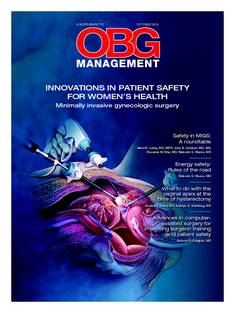
Click here to download the PDF.
Every surgeon knows that, if you operate, complications will follow. Surgeons are perfectionists and strive to reduce complications through years of diligent personal training and continuous quality improvement. Surgeons hate complications, especially those that might be preventable (such as retained foreign bodies, wrong site surgery, and medication errors).
In this special issue of OBG Management, world-renowned experts focus on topical issues in safety in minimally invasive gynecologic surgery (MIGS). In a roundtable, Drs. Neal Lonky, John Gebhart, Rosanne Kho, and Malcolm Munro discuss important issues in MIGS, including the need to prioritize the vaginal and laparoscopic routes of hysterectomy and the role of single-port surgery. In a concise yet detailed discussion of safety issues related to radiofrequency and ultrasound energy devices, Dr. Munro alerts us to the dangers of heat injury and direct and capacitative coupling. Drs. Andrew Sokol and Katelyn Smithling provide guidance on preventing apical prolapse of the vagina following hysterectomy. And Dr. Antonio Gargiulo explores the rapidly expanding role of simulation training with computer-assisted (robotic) surgical simulators and predicts that, instead of learning surgery on patients, future trainees will gain skills in a simulation environment.
We thank the master surgeons who participated in this special issue for providing guidance and helping us to reduce complications. Our patients are the beneficiaries of the wisdom provided herein.
>>Robert L. Barbieri, MD
Editor in Chief, OBG Management
To view the video, "McCall" culdoplasty technique by Mickey Karram, MD, that accompanies the article by Sokol et al in this supplement, click here.

Click here to download the PDF.
Every surgeon knows that, if you operate, complications will follow. Surgeons are perfectionists and strive to reduce complications through years of diligent personal training and continuous quality improvement. Surgeons hate complications, especially those that might be preventable (such as retained foreign bodies, wrong site surgery, and medication errors).
In this special issue of OBG Management, world-renowned experts focus on topical issues in safety in minimally invasive gynecologic surgery (MIGS). In a roundtable, Drs. Neal Lonky, John Gebhart, Rosanne Kho, and Malcolm Munro discuss important issues in MIGS, including the need to prioritize the vaginal and laparoscopic routes of hysterectomy and the role of single-port surgery. In a concise yet detailed discussion of safety issues related to radiofrequency and ultrasound energy devices, Dr. Munro alerts us to the dangers of heat injury and direct and capacitative coupling. Drs. Andrew Sokol and Katelyn Smithling provide guidance on preventing apical prolapse of the vagina following hysterectomy. And Dr. Antonio Gargiulo explores the rapidly expanding role of simulation training with computer-assisted (robotic) surgical simulators and predicts that, instead of learning surgery on patients, future trainees will gain skills in a simulation environment.
We thank the master surgeons who participated in this special issue for providing guidance and helping us to reduce complications. Our patients are the beneficiaries of the wisdom provided herein.
>>Robert L. Barbieri, MD
Editor in Chief, OBG Management
To view the video, "McCall" culdoplasty technique by Mickey Karram, MD, that accompanies the article by Sokol et al in this supplement, click here.

Click here to download the PDF.
Every surgeon knows that, if you operate, complications will follow. Surgeons are perfectionists and strive to reduce complications through years of diligent personal training and continuous quality improvement. Surgeons hate complications, especially those that might be preventable (such as retained foreign bodies, wrong site surgery, and medication errors).
In this special issue of OBG Management, world-renowned experts focus on topical issues in safety in minimally invasive gynecologic surgery (MIGS). In a roundtable, Drs. Neal Lonky, John Gebhart, Rosanne Kho, and Malcolm Munro discuss important issues in MIGS, including the need to prioritize the vaginal and laparoscopic routes of hysterectomy and the role of single-port surgery. In a concise yet detailed discussion of safety issues related to radiofrequency and ultrasound energy devices, Dr. Munro alerts us to the dangers of heat injury and direct and capacitative coupling. Drs. Andrew Sokol and Katelyn Smithling provide guidance on preventing apical prolapse of the vagina following hysterectomy. And Dr. Antonio Gargiulo explores the rapidly expanding role of simulation training with computer-assisted (robotic) surgical simulators and predicts that, instead of learning surgery on patients, future trainees will gain skills in a simulation environment.
We thank the master surgeons who participated in this special issue for providing guidance and helping us to reduce complications. Our patients are the beneficiaries of the wisdom provided herein.
>>Robert L. Barbieri, MD
Editor in Chief, OBG Management
To view the video, "McCall" culdoplasty technique by Mickey Karram, MD, that accompanies the article by Sokol et al in this supplement, click here.
Highlights From the 2015 CMSC Annual Meeting
Click here to download the PDF.
Click here to download the PDF.
Click here to download the PDF.
Carrier Screening for Duchenne Muscular Dystrophy
Duchenne muscular dystrophy (DMD), an X-linked condition, is the most common muscular dystrophy in children and affects families of all ethnicities. Incidence is about 1 in 3,500 boys. Approximately two-thirds of clinically diagnosed cases of DMD are attributable to a carrier mother, who is likely unaware that she is a carrier. In addition to providing information about reproductive risks, carrier screening can identify women who are, themselves, at risk of health effects caused by defects in the DMD gene.
This supplement examines the latest crucial advances in DMD carrier screening.
Click here to download the PDF.
To view an exclusive video on the pivotal findings discussed in this supplement, click here.
Duchenne muscular dystrophy (DMD), an X-linked condition, is the most common muscular dystrophy in children and affects families of all ethnicities. Incidence is about 1 in 3,500 boys. Approximately two-thirds of clinically diagnosed cases of DMD are attributable to a carrier mother, who is likely unaware that she is a carrier. In addition to providing information about reproductive risks, carrier screening can identify women who are, themselves, at risk of health effects caused by defects in the DMD gene.
This supplement examines the latest crucial advances in DMD carrier screening.
Click here to download the PDF.
To view an exclusive video on the pivotal findings discussed in this supplement, click here.
Duchenne muscular dystrophy (DMD), an X-linked condition, is the most common muscular dystrophy in children and affects families of all ethnicities. Incidence is about 1 in 3,500 boys. Approximately two-thirds of clinically diagnosed cases of DMD are attributable to a carrier mother, who is likely unaware that she is a carrier. In addition to providing information about reproductive risks, carrier screening can identify women who are, themselves, at risk of health effects caused by defects in the DMD gene.
This supplement examines the latest crucial advances in DMD carrier screening.
Click here to download the PDF.
To view an exclusive video on the pivotal findings discussed in this supplement, click here.
LANDMARK STUDY: Cell-Free DNA Analysis for Down Syndrome Screening in the General Pregnancy Population
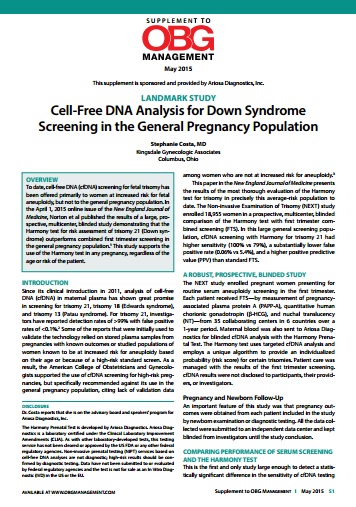
Click here to download the PDF.
To date, cell-free DNA (cfDNA) screening for fetal trisomy has been offered primarily to women at increased risk for fetal aneuploidy, but not to the general pregnancy population. Recently, the results of a large, prospective, multicenter, blinded study were published, demonstrating that the Harmony test for risk assessment of trisomy 21 (Down Syndrome) outperforms combined first trimester screening in the general pregnancy population. This supplement examines the crucial findings of cfDNA analysis for Down syndrome screening in the general pregnancy population using the Harmony test.
The Harmony Prenatal Test is developed by Ariosa Diagnostics. Ariosa Diagnostics is a laboratory certified under the Clinical Laboratory Improvement Amendments (CLIA). As with other laboratory-developed tests, this testing service has not been cleared or approved by the US FDA or any other federal regulatory agencies. Non-invasive prenatal testing (NIPT) services based on cell-free DNA analyses are not diagnostic; high-risk results should be confirmed by diagnostic testing. Data have not been submitted to or evaluated by Federal regulatory agencies and the test is not for sale as an In Vitro Diagnostic (IVD) in the US or the EU.
To view an exclusive video on the pivotal findings discussed in this supplement, click here.

Click here to download the PDF.
To date, cell-free DNA (cfDNA) screening for fetal trisomy has been offered primarily to women at increased risk for fetal aneuploidy, but not to the general pregnancy population. Recently, the results of a large, prospective, multicenter, blinded study were published, demonstrating that the Harmony test for risk assessment of trisomy 21 (Down Syndrome) outperforms combined first trimester screening in the general pregnancy population. This supplement examines the crucial findings of cfDNA analysis for Down syndrome screening in the general pregnancy population using the Harmony test.
The Harmony Prenatal Test is developed by Ariosa Diagnostics. Ariosa Diagnostics is a laboratory certified under the Clinical Laboratory Improvement Amendments (CLIA). As with other laboratory-developed tests, this testing service has not been cleared or approved by the US FDA or any other federal regulatory agencies. Non-invasive prenatal testing (NIPT) services based on cell-free DNA analyses are not diagnostic; high-risk results should be confirmed by diagnostic testing. Data have not been submitted to or evaluated by Federal regulatory agencies and the test is not for sale as an In Vitro Diagnostic (IVD) in the US or the EU.
To view an exclusive video on the pivotal findings discussed in this supplement, click here.

Click here to download the PDF.
To date, cell-free DNA (cfDNA) screening for fetal trisomy has been offered primarily to women at increased risk for fetal aneuploidy, but not to the general pregnancy population. Recently, the results of a large, prospective, multicenter, blinded study were published, demonstrating that the Harmony test for risk assessment of trisomy 21 (Down Syndrome) outperforms combined first trimester screening in the general pregnancy population. This supplement examines the crucial findings of cfDNA analysis for Down syndrome screening in the general pregnancy population using the Harmony test.
The Harmony Prenatal Test is developed by Ariosa Diagnostics. Ariosa Diagnostics is a laboratory certified under the Clinical Laboratory Improvement Amendments (CLIA). As with other laboratory-developed tests, this testing service has not been cleared or approved by the US FDA or any other federal regulatory agencies. Non-invasive prenatal testing (NIPT) services based on cell-free DNA analyses are not diagnostic; high-risk results should be confirmed by diagnostic testing. Data have not been submitted to or evaluated by Federal regulatory agencies and the test is not for sale as an In Vitro Diagnostic (IVD) in the US or the EU.
To view an exclusive video on the pivotal findings discussed in this supplement, click here.
DIAGNOSING CTD IN CLINICAL PRACTICE
This educational video is sponsored by Exagen Diagnostics, Inc.
For more information, please read the supplement below.
This educational supplement to Rheumatology News is supported by Exagen Diagnostics, Inc.
Nimesh Dayal, MD
Arthritis Center of Orlando
Ocoee, FL
John Goldman, MD, MACR, FACP, CCD
Chief of Rheumatology
Emory St. Joseph’s Hospital
Atlanta, GA
Richard Haddad, MD, FACR
Clinical Assistant Professor of Medicine
Rutgers/Robert Wood Johnson
Red Bank, NJ
Patricia Hopkins, MD
Private Practice
Quincy, MA
James Mossell, DO
Tift Regional Medical Center
Tifton, GA
This educational video is sponsored by Exagen Diagnostics, Inc.
For more information, please read the supplement below.
This educational supplement to Rheumatology News is supported by Exagen Diagnostics, Inc.
Nimesh Dayal, MD
Arthritis Center of Orlando
Ocoee, FL
John Goldman, MD, MACR, FACP, CCD
Chief of Rheumatology
Emory St. Joseph’s Hospital
Atlanta, GA
Richard Haddad, MD, FACR
Clinical Assistant Professor of Medicine
Rutgers/Robert Wood Johnson
Red Bank, NJ
Patricia Hopkins, MD
Private Practice
Quincy, MA
James Mossell, DO
Tift Regional Medical Center
Tifton, GA
This educational video is sponsored by Exagen Diagnostics, Inc.
For more information, please read the supplement below.
This educational supplement to Rheumatology News is supported by Exagen Diagnostics, Inc.
Nimesh Dayal, MD
Arthritis Center of Orlando
Ocoee, FL
John Goldman, MD, MACR, FACP, CCD
Chief of Rheumatology
Emory St. Joseph’s Hospital
Atlanta, GA
Richard Haddad, MD, FACR
Clinical Assistant Professor of Medicine
Rutgers/Robert Wood Johnson
Red Bank, NJ
Patricia Hopkins, MD
Private Practice
Quincy, MA
James Mossell, DO
Tift Regional Medical Center
Tifton, GA
